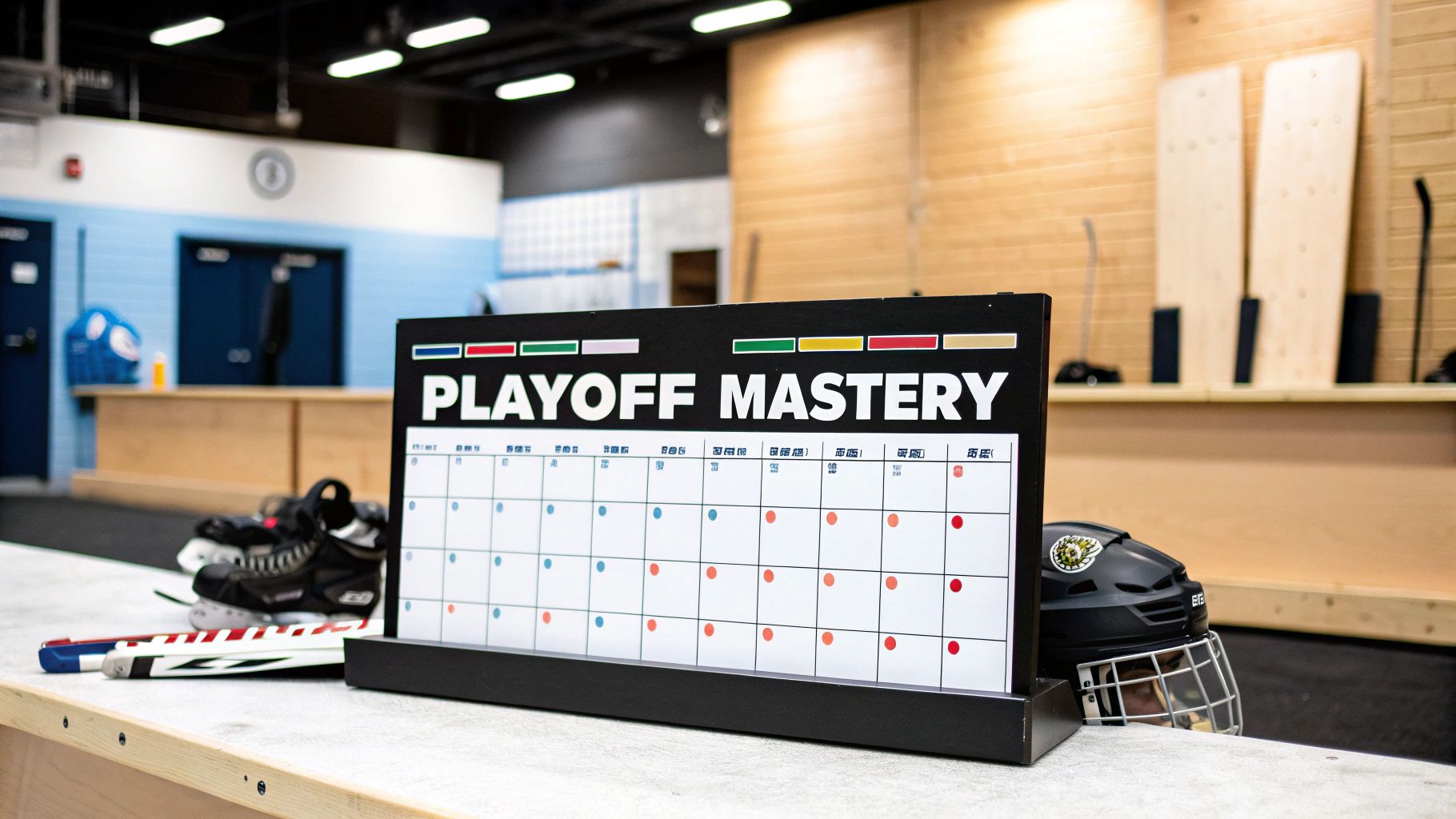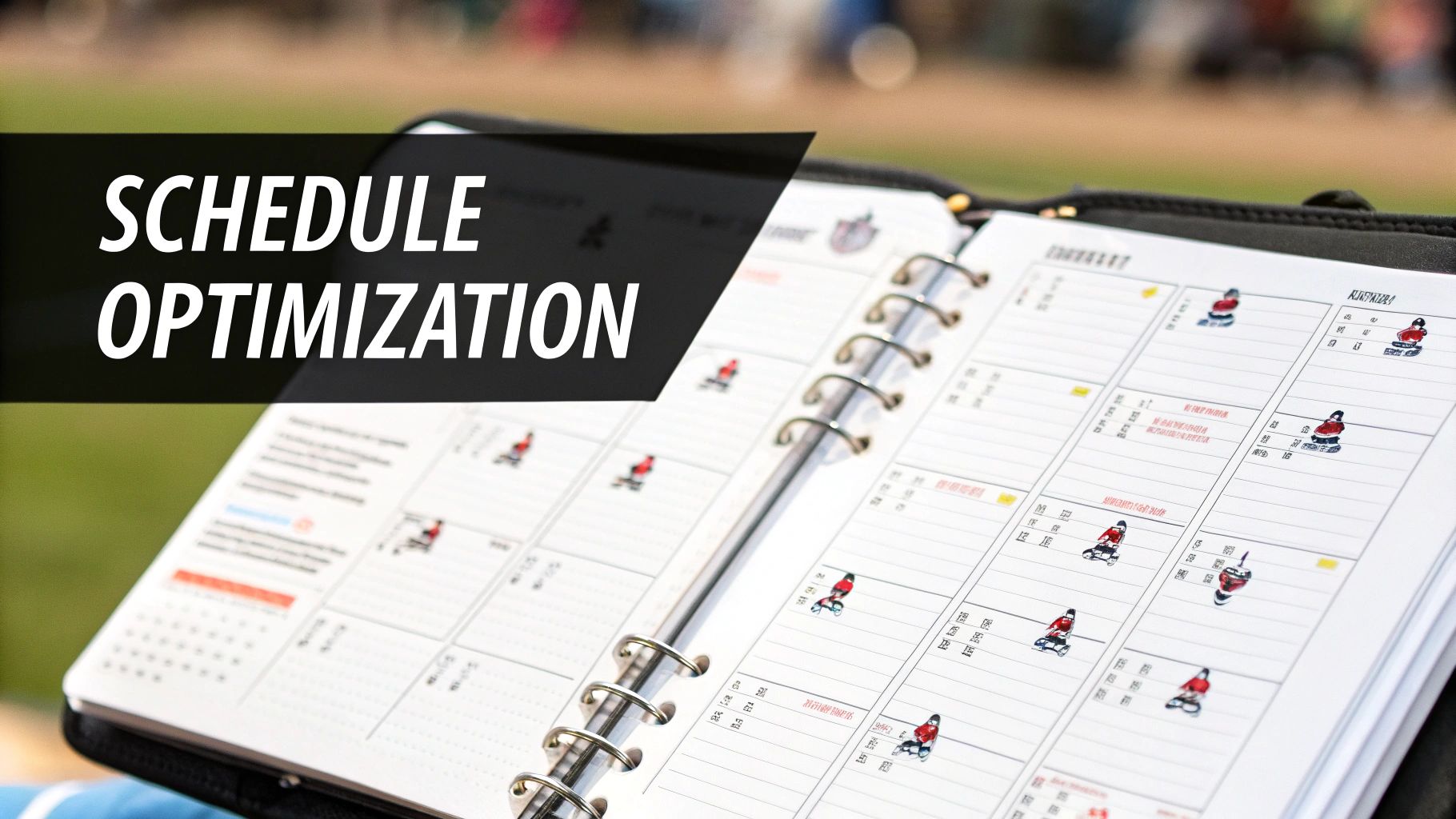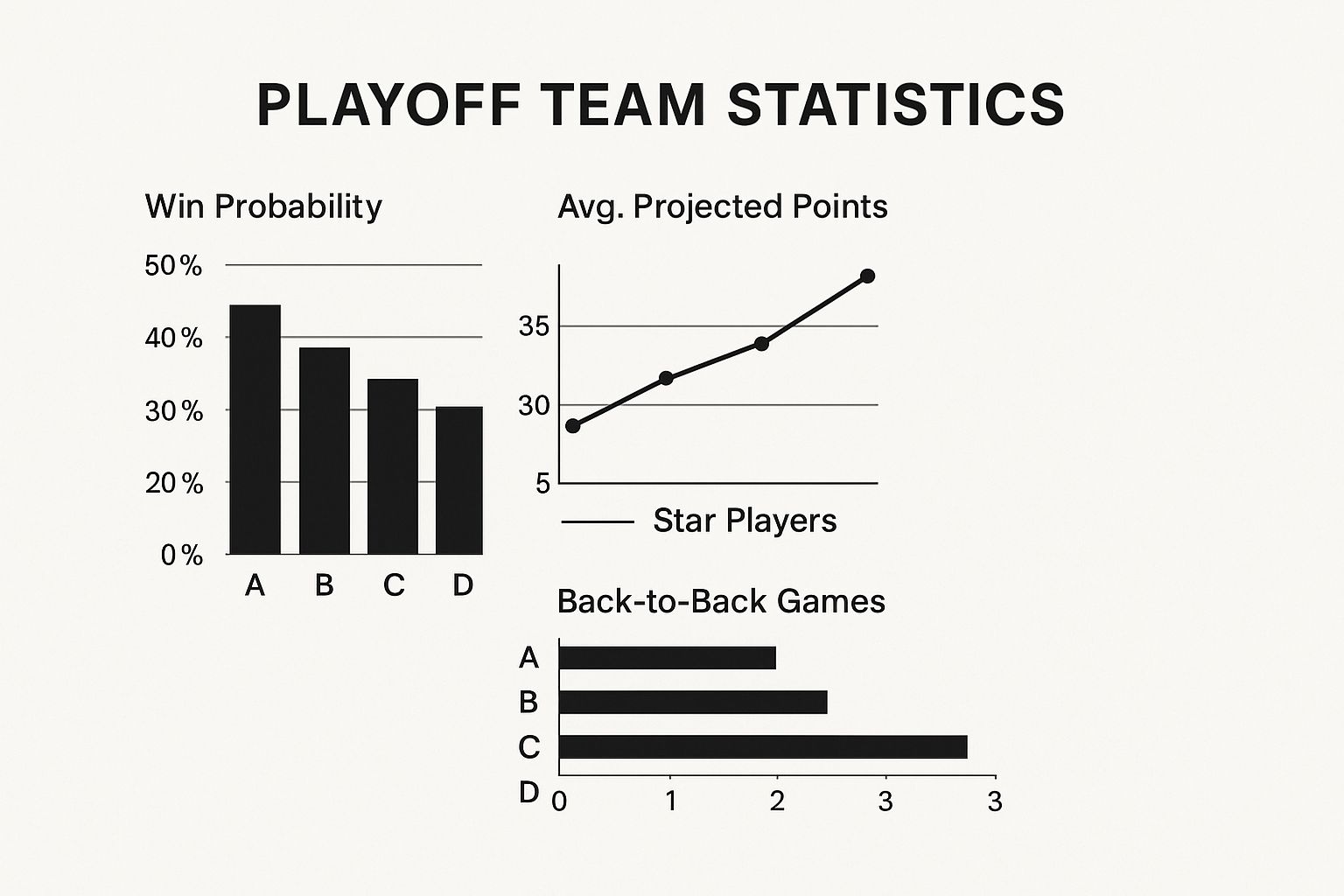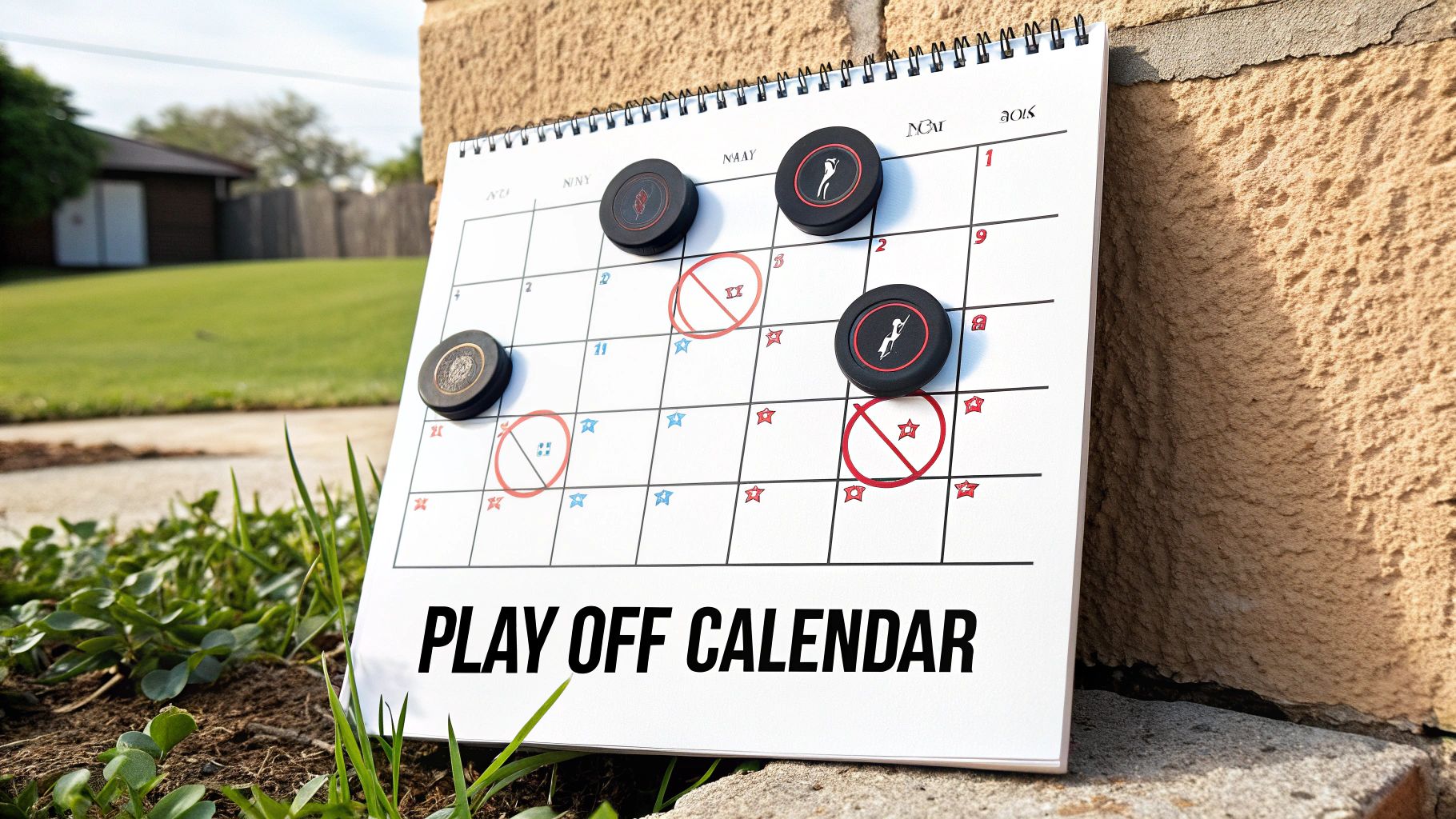Fantasy Hockey Playoff Schedule Mastery Guide

To nail your fantasy hockey playoffs, you need a firm grip on how the real-world NHL postseason calendar shapes your league’s championship run. This schedule is the ultimate roadmap—it tells you which players are active, how many games they’ll play, and who gives you the best shot at the title.
Why Your Playoff Schedule Matters
The fantasy hockey playoff schedule is the backbone of your championship hunt, setting the dates for your matchups based on the official NHL Stanley Cup Playoffs. Getting this calendar wrong is one of the fastest ways to fall behind your leaguemates. It's the key to making smart roster moves, whether you're loading up on players for the final push or grabbing a key guy off the waiver wire.
Think of it as more than just a list of dates. It's a strategic guide. For instance, many Canadian-based fantasy leagues mirror the NHL's April-to-June playoff timeline but use their own condensed round formats to fit the competition. You can get a feel for these kinds of league structures over at cafhl.sths.ca.
To get a real edge, you have to master these three core elements:
- Matchup Duration: Is your matchup a one-week sprint or does it last an entire NHL series? This changes everything. For a one-week matchup, you want short-term game volume. For a full series, you need players on teams you expect to go deep.
- Start and End Dates: Know the exact start and end of each fantasy round. This is crucial for planning when to add and drop players to maximize your games played.
- Game Volume: This is the big one. The number of games an NHL team plays during your fantasy matchup is the most important factor. A superstar with only two games is often way less valuable than a third-liner who plays four times.
Key Playoff Schedule Components at a Glance
To make it even clearer, here’s a quick rundown of the essential schedule components and why they are so critical for your team's success.
| Component | What It Means | Why It Matters for Your Team |
|---|---|---|
| Start & End Dates | The exact dates your fantasy rounds begin and end. | Determines your window for waiver moves and lineup planning. |
| Matchup Length | Whether a round lasts one week or a full NHL series. | Dictates if you should prioritize short-term volume or long-term potential. |
| Game Volume | The number of games each NHL team plays during a fantasy round. | The single biggest factor for fantasy production. More games = more points. |
| Off-Night Games | Games played on lighter NHL schedule days (Mon, Wed, Fri, Sun). | Helps you maximize your roster spots and avoid benching active players. |
| Back-to-Backs | Two games played by an NHL team on consecutive nights. | Can affect goalie starts and player fatigue, creating streaming opportunities. |
Understanding these pieces isn't just about knowing the dates; it's about seeing the strategic opportunities hidden within the calendar. A manager who pays attention to game volume and off-nights will always have an advantage over someone who just looks at player names.
How to Analyze the NHL Playoff Bracket for an Edge

In fantasy hockey playoffs, your schedule's value is completely tied to the real-life NHL bracket. Winning isn't about just rostering stars; it's about rostering players whose teams will play the most games. A deep playoff run means more ice time and more chances for your guys to rack up points.
Start by mapping out the entire bracket—don't just stop at the first round. You need to look ahead. Analyze potential second and third-round matchups to pinpoint teams with a smoother path to the Stanley Cup Final. A team might look great with a favourable first-round opponent, but if they're on a collision course with a powerhouse in round two, their players' long-term value takes a serious hit.
Evaluating Key Matchup Factors
When you're sizing up a series, you have to look beyond a team's win-loss record. A few key stats can signal a potential upset or a lopsided series waiting to happen.
- Goaltending Performance: A hot goalie can absolutely steal a series. Always check recent save percentages and goals-against averages for both starting netminders. Momentum is huge in the playoffs.
- Head-to-Head Record: How did these two teams match up during the regular season? This can often reveal stylistic advantages or disadvantages that don't show up on paper.
- Special Teams Efficiency: Power play and penalty kill success get magnified in tight, low-scoring playoff games. For a deeper look, you can analyze detailed NHL special teams rankings to see which teams have a true advantage when a penalty is called.
Here’s a practical example: say a top-seeded team relies heavily on its power play to generate offence. If they're facing an opponent with a top-five penalty kill, their star offensive players might get shut down and underperform. It’s a classic trap.
A good rule of thumb is to diversify your roster. Grab key players from at least three or four different contenders. This strategy acts as insurance, protecting you from an unexpected early-round upset that could otherwise completely wreck your fantasy team's chances.
Winning Strategies for In-Playoff Roster Moves

This is it. The fantasy hockey playoffs are where championships are won, and your roster management has to be just as intense as the games on the ice. Forget the patient approach of the regular season—now is the time for swift, decisive action. Waiting even one extra day on a player can be the difference between hoisting the trophy and going home empty-handed.
The single most important rule? Be absolutely ruthless with players whose NHL teams get eliminated.
Once a team is knocked out of the Stanley Cup Playoffs, their players are dead weight on your fantasy roster. Don't hesitate. Drop them immediately to free up a spot for someone still in the fight. This aggressive mindset ensures you're maximizing every possible game played and squeezing out points right up to the final horn of your matchup.
Mastering the Waiver Wire and Player Streaming
Your best friend during the playoffs is the waiver wire. It's your most powerful tool for finding those crucial extra games. You should be constantly scanning for available players on teams that are not only still alive but also have a packed schedule for the current fantasy week. This is where player streaming becomes a game-changer.
Streaming is all about adding and dropping players to capitalize on favourable short-term schedules. It’s a simple concept with a huge payoff.
- Target Off-Nights: Look for players who are active on the NHL's lighter schedule days (think Monday, Wednesday, or Sunday). This lets you slot them into your lineup without having to bench one of your core studs.
- Hunt for Back-to-Backs: Teams playing on consecutive nights often create sneaky value. It could be a backup goalie getting a surprise start or a depth scorer seeing more ice time.
A well-executed streaming strategy can easily add a few extra man-games to your weekly total, giving you a massive statistical advantage over your opponent. For a deeper dive, check out our guide on how to master the fantasy hockey waiver wire.
This proactive approach is especially vital in tight matchups where every single shot, block, or point matters. In a country like Canada, where fantasy hockey is practically a national pastime, everyone knows that a star like Nathan MacKinnon can single-handedly swing a playoff week. You can find more insights on Canadian player playoff stats on hockeydraft.ca.
Mastering Game Volume and Off-Day Scheduling
When it comes to the fantasy hockey playoffs, the schedule is everything. It’s not just about which teams are playing, but how often they hit the ice during your matchup week. A simple but incredibly effective strategy is to sit down and manually count the games for every single NHL team in your fantasy round. More games mean more chances to rack up points.
Think about it: a superstar with only two games in a week can easily be outscored by a decent second-line player who laces up four times. This concept is called game volume, and it's the single most important factor for winning a weekly head-to-head matchup. Always prioritize players on teams with four-game weeks over those with just two or three—it’s a foundational move that wins championships.
Beyond just the total number of games, you need to zoom in on the daily schedule to spot the "off-days." These are usually the quieter nights on the NHL calendar, like Mondays, Wednesdays, and Sundays, when only a handful of teams are in action.
The Strategic Value of Off-Day Players
This is where you can gain a massive edge. Rostering players who are active on these light game nights allows you to maximize your daily roster slots. You'll avoid the dreaded decision of having to bench a good player on a jam-packed Saturday when your lineup is already full.
For example, if your forward spots are all locked up on a busy Thursday but you have an empty slot on Friday, streaming in a player with a Friday game gives you a completely free boost to your weekly totals. It's found points.
This chart helps visualize some key playoff metrics, including how team win probabilities and back-to-back games can influence player availability and performance.

Here's a quick look at how you can track this for a given week.
| Sample Weekly Game Volume Analysis | | :--- | :---: | :---: | :---: | :---: | :---: | :---: | :---: | :---: | | NHL Team | Mon | Tues | Wed | Thur | Fri | Sat | Sun | Total Games | | Edmonton Oilers | | X | | X | | X | X | 4 | | Toronto Maple Leafs | X | | X | | X | | | 3 | | Vancouver Canucks | | X | | X | | | | 2 | | Colorado Avalanche | X | | X | | X | | X | 4 |
In this scenario, a manager with players from the Oilers or Avalanche is in a much stronger position. They get four cracks at piling up stats, while the Canucks owner only gets two.
The data shows how teams with better odds often have tougher schedules, which creates unique opportunities for savvy fantasy managers. Combining this schedule analysis with in-depth player data is the final step. You can dive into various fantasy hockey projections to see exactly how game volume is expected to impact individual player stats for the week.
Adapting Your Strategy to Different Playoff Formats

Not all fantasy playoffs are created equal, and your success hinges on matching your strategy to your league’s specific rules. The approach that wins a weekly head-to-head matchup will get you nowhere in a total points pool. Knowing the difference is critical before you even glance at the fantasy hockey playoff schedule.
The most common format is the weekly Head-to-Head (H2H) matchup. The goal here is simple: outscore one opponent over a seven-day stretch. This puts a massive premium on short-term game volume. A good player with four games in a week is almost always a better bet than a superstar with only two.
Total Points and Bracket Pools
On the other hand, Total Points pools are a marathon, not a sprint. In these leagues, your roster racks up stats for the entire duration of the Stanley Cup Playoffs. The manager with the most points when the Cup is hoisted wins.
For Total Points pools, your focus has to shift from weekly game volume to predicting which teams will go deep. Longevity is everything here, which means loading up on players from the two or three teams you genuinely believe can reach the Conference Finals or Stanley Cup Final. An early exit from one of your core teams can be a season-killer.
Finally, Bracket-Style tournaments demand a completely different mindset.
- Pick the Winner: You’re often locking in a full roster before the playoffs even start.
- Predict the Bracket: Your success is tied directly to correctly predicting series winners to maximize how many games your players are active for.
- High Risk, High Reward: A shocking first-round upset can torpedo your entire bracket if you stacked players from the losing team.
Common Fantasy Playoff Schedule Questions
Navigating the fantasy hockey playoffs can throw some curveballs your way, especially when the pressure is on. Getting your head around the common sticking points is key to managing your team with confidence and dodging costly mistakes during a championship run.
Let’s tackle some of the most frequently asked questions.
When Do Fantasy Hockey Playoffs Start?
Most fantasy hockey playoffs are set to kick off right alongside the NHL Stanley Cup Playoffs, which usually means mid-April. But here's the catch: your league commissioner can set custom start dates.
It is absolutely crucial to confirm the official calendar for your specific league well ahead of time. This lets you plan your final regular-season moves without any last-minute surprises.
What to Do with Players on Eliminated Teams?
Once a player's NHL team gets knocked out of the playoffs, they stop racking up points. From that moment on, they're dead weight on your roster.
The only smart move is to drop them immediately. Use that valuable roster spot to grab a player from the waiver wire whose team is still in the fight. This is all about maximizing your potential points for the rest of the matchup.
In playoff pools, game volume is everything. A solid second-liner who plays 15+ games will almost always outscore an elite superstar whose team gets swept in the first round after just four games.
Superstar on a Weak Team or Good Player on a Contender?
This is a classic fantasy playoff dilemma, but the answer is almost always the same: go with the good-to-great players on teams you believe will make a deep playoff run.
A superstar on a team facing a quick first-round exit simply won't play enough games to keep up. Their production gets cut short, while a second-liner who makes it to the third round keeps piling up points.
How Matchup Duration Affects Strategy
How long your matchups last completely changes your approach. It’s the difference between focusing on short-term gains and playing the long game.
- Weekly H2H Matchups: Your strategy should be simple: maximize game volume within that specific seven-day window. Who plays the most before the weekly reset? That's your guy.
- Full-Series Matchups: In this format, you want to prioritize players on the team you think will win the series. They are guaranteed to play more games, giving you a higher scoring floor.
For the most detailed player stats and analytics to help you dominate your playoffs, check out the tools and resources at PuckNStick. Find your winning edge at https://www.pucknstick.com.
